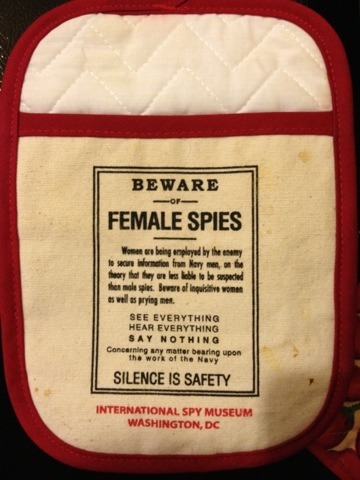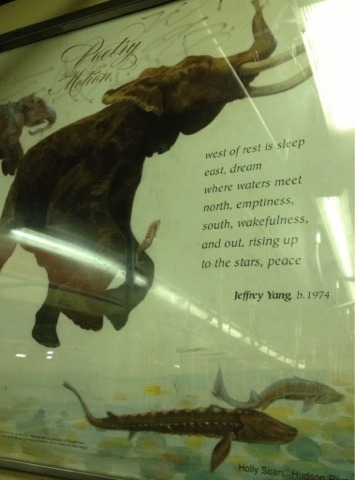Kristin Cashore's Blog, page 43
December 10, 2012
Just Sharing Some Beauty Via Edna St. Vincent Millay
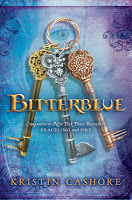 Bitterblue is one of Kirkus Reviews' Best Books of 2012. I am overwhelmed with blessings.
Bitterblue is one of Kirkus Reviews' Best Books of 2012. I am overwhelmed with blessings.So, yesterday, while I was doing some financial organizing, I stumbled across two poems by Edna St. Vincent Millay. Possibly this highlights the key problem I have with my financial organizing, but anyway :). I just had to share them. The first is about death. The second is about love.
Dirge Without Music
I am not resigned to the shutting away of loving hearts in the hard ground.
So it is, and so it will be, for so it has been, time out of mind:
Into the darkness they go, the wise and the lovely. Crowned
With lilies and with laurel they go; but I am not resigned.
Lovers and thinkers, into the earth with you.
Be one with the dull, the indiscriminate dust.
A fragment of what you felt, of what you knew,
A formula, a phrase remains, --- but the best is lost.
The answers quick & keen, the honest look, the laughter, the love,
They are gone. They have gone to feed the roses. Elegant and curled
Is the blossom. Fragrant is the blossom. I know. But I do not approve.
More precious was the light in your eyes than all the roses in the world.
Down, down, down into the darkness of the grave
Gently they go, the beautiful, the tender, the kind;
Quietly they go, the intelligent, the witty, the brave.
I know. But I do not approve. And I am not resigned.
Love Is Not All
Love is not all: it is not meat nor drink
Nor slumber nor a roof against the rain;
Nor yet a floating spar to men that sink
And rise and sink and rise and sink again;
Love can not fill the thickened lung with breath,
Nor clean the blood, nor set the fractured bone;
Yet many a man is making friends with death
Even as I speak, for lack of love alone.
It well may be that in a difficult hour,
Pinned down by pain and moaning for release,
Or nagged by want past resolution's power,
I might be driven to sell your love for peace,
Or trade the memory of this night for food.
It well may be. I do not think I would.
Published on December 10, 2012 09:22
December 6, 2012
The Sun Sets at 4PM These Days...
...and after that, Brattle Square Florist in Harvard Square glows with color.
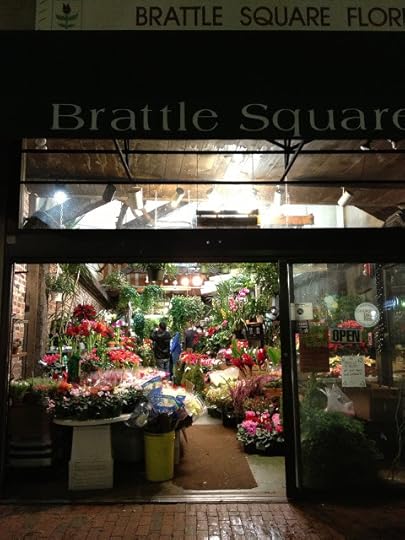

 Happy sigh...
Happy sigh...
In another part of Harvard Square... I see that Bitterblue is among the Holiday Hundred at Harvard Book Store, which means it's 20% off.
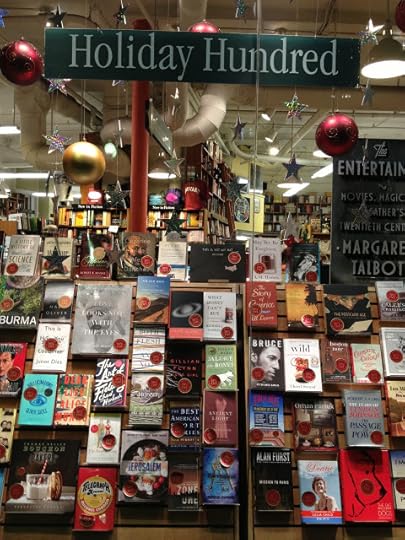
I mention this because this is my local indie and the way to get books signed/personalized by me (before you finish your online order, a comments box will appear; please specify in the comments box that you'd like the book signed, and to whom you'd like it personalized, if anyone) -- BUT, fair warning: if you are thinking of my signed books as Christmas presents, please order before December 17, because I won't be around after that to sign them. I can't sign books from out of state. I tried once. My arm wasn't long enough.
Happy light and dark, everyone.


 Happy sigh...
Happy sigh...In another part of Harvard Square... I see that Bitterblue is among the Holiday Hundred at Harvard Book Store, which means it's 20% off.

I mention this because this is my local indie and the way to get books signed/personalized by me (before you finish your online order, a comments box will appear; please specify in the comments box that you'd like the book signed, and to whom you'd like it personalized, if anyone) -- BUT, fair warning: if you are thinking of my signed books as Christmas presents, please order before December 17, because I won't be around after that to sign them. I can't sign books from out of state. I tried once. My arm wasn't long enough.
Happy light and dark, everyone.
Published on December 06, 2012 07:46
December 2, 2012
Pictures of a Book Being Made
To make up for my recent lack of posting -- and to celebrate Bitterblue being named a New York Times Book Review Notable Children's Book of 2012 -- this post will be about something :).
Disclaimer: All the photos in this post are of my own work and are owned by me. If you use them for any purpose, please identify them and attribute them to me. Do not change them in any way or use them commercially.
What follows is essentially my tour presentation for Bitterblue... it is the story of how the book was written. Here goes.
As you probably know if you've spent much time on my blog, I write by hand.
 Click any photo in this post to ginormify.
Click any photo in this post to ginormify.
Above is the first page of the first draft of Bitterblue. Note that the date is October 25, 2007. Also note -- if you've read Bitterblue -- that this is not how the final book begins. And also that not a whole lot from this page made it into the final draft. What you see above is fairly typical: I write, I scratch out a word here and there, I scratch out a line, I change things; then I put it away for the day, come back the next day, realize the entire thing is crap, and cross the whole page out with a big X. Below is another fairly typical page:
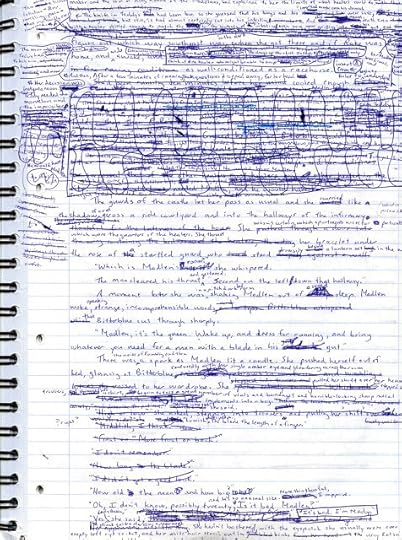 Reminder: click to make it BIG.
Reminder: click to make it BIG.
Once I've written 40 or 50 pages -- or, essentially, get to a point where I'm starting to worry about the house burning down (though I do keep my notebook in a fireproof, waterproof safe) -- I transcribe my handwriting into my Word document using voice recognition software (because I can't type much at all without pain). The transcription, like every other moment when I'm looking at my work, is an opportunity for crossing more things out (symbolically) and changing things.
That's my essential process for every book. But, of course, there's more to it. For example, while I write, I scribble cheery, encouraging notes to myself.

These notes are not born of modesty or low self-esteem. They are born of the simple truth that a first draft is crap; a first draft is terrible, horrible, no good, very bad; and the writer, moving forward while leaving a stream of detritus in her wake, CAN GET VERY DISCOURAGED. But she keeps moving, because, as Robert Frost said, "The best way out is always through."
Sometimes, I'm just trying to keep myself from panicking.

Notice the date. It's April 3, 2010. I've been writing for two and half years. I'm nowhere near the end of the first draft, which is an insufferable mess. I AM FREAKING OUT and trying very hard not to.
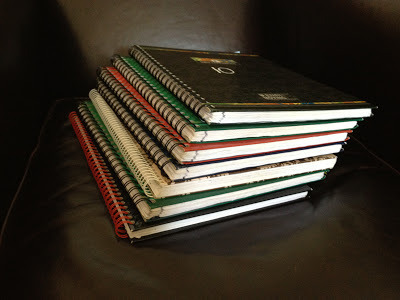
Bitterblue's first draft went on like that for seven notebooks.
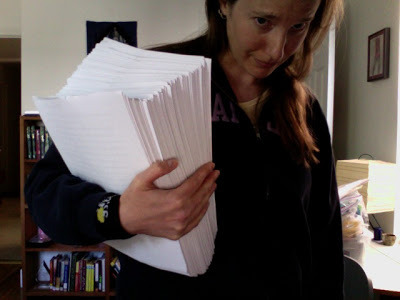
When I finally finished the first draft, three years after I'd begun, it was 800 pages long and weighed 7000 pounds.
I sent it to my patient, PATIENT editor. She worked her way through it, poor dear, then sent me one of her typical, long, detailed editorial letters. Here's what's working, she said; here's what isn't; here's what I see you trying to do. Then she said something miraculous. I'm paraphrasing, but what she said was along the lines of: This is going to sound like a crazy idea, but now, at the beginning of the revision process, is the time to voice crazy ideas. Would you consider starting again from scratch?
!!!!!!!!
*insert nervous breakdown*
*insert perspective*
*insert reconsideration*
*insert realization that she is 100% right*
Here's the reason this ended up being the best thing my editor could have said. Within that 800-page mess, the final story was all there. If you were to read Bitterblue's first draft, you would come away with essentially the same story a person reading the final book comes away with. But there was a lot of extra, unnecessary stuff in there, too; I'd spent a lot of space working things out for myself that didn't really need to be worked out for the reader. There were extra characters who could be consolidated into fewer people to simplify things. There were plot complications that didn't need to be so complicated. The themes were buried in crap; they weren't shining. There was an earthquake! (Literally. One plot point was an earthquake.) The story I was trying to tell didn't need an earthquake.
Now, normally when revising, I sit down with the printout of the draft I have and start crossing things out, working with what I've got, molding, trying to change the shape of an existing thing into something new. But here was my editor suggesting I start again from scratch.
I put the draft to the side, where I could reach it, but where it wasn't right in front of me. I pulled a blank sheet of paper toward me. And I played what was essentially a mental trick on myself: instead of determining to decide what to get rid of, what to change the shape of, what to mold, I said to myself, "I'm writing a book. La la la, here I am, writing a brand new book. Hmm. What, from this pile to my side, might I add?"
You perceive the difference?
It was an amazing mental freedom; it allowed for a freshness in my second draft, and a freedom from the swamp of my first draft. I was able to write a second draft while NOT stuck inside that first-draft swamp. I was able to tell the same story all over again, and this time tell it so much better. Thank you, stellar editor Kathy Dawson. You saved my book.
Here's the first page of the second draft of Bitterblue.

The date is December 2, 2010 -- more than three years since I'd started writing. Can you read what it says? It is almost word for word the way the final version of Bitterblue opens. I feel like this is an important point: it wasn't until I'd spent three years writing a mess of a draft that I figured out how Bitterblue needed to begin.
Most days during this revision, it was too depressing to acknowledge I was writing a whole new book, so I would take the printout of the old draft, cross out all the lines, and write the new book in the spaces in between. I just couldn't bear the thought of filling up seven more notebooks; writing on the old printout made me feel like I was revising rather than rewriting, which was comforting. Another mental trick (that somehow contradicted the first mental trick, I know... brains are complicated ^_^). In the page shown below, I've crossed out the old scene (which was related to that earthquake), written a new scene that has no connection whatsoever to the old scene, then crossed out most of the new stuff, too. Sigh.

And lest you think it was worse than it actually was!, there were, in fact, pages where some of what I'd written before made it into the next draft :).

This second draft of Bitterblue took me about five months, if I recall correctly. Five and a half? Easily the longest revision of my life so far.
And what happened after I finished Draft 2?
My editor continued to send me amazing, helpful letters; friends read and gave feedback; and I revised it several more times.
 Drafts 1, 2, 3, 4, and 5, and the copyedit and typeset manuscript.
Drafts 1, 2, 3, 4, and 5, and the copyedit and typeset manuscript.
In total, Bitterblue was four years of drafting and revising from start to finish.
******
There's a reason I like to tell this story. It's not because I enjoy making my audience gasp in horror (though I do). It's because I know there are always writers in the audience. I know there are people in the audience who are writing and who feel hopeless and discouraged by their own flawed work. I tell this story because I want to get this message across: THAT'S HOW IT FEELS TO BE A WRITER. It doesn't mean your book will never become what you want it to be. It doesn't mean you're not talented; it doesn't mean you're wasting your time; it doesn't mean your book isn't about anything; it doesn't mean you should give up. It only means that you're writing.
I think I've said this on the blog before: I imagine my self-doubt/hopelessness/discouragement as this guy who sits next to me in my chair as I'm writing. He's always there. He is a necessary part of the process; he will never go away; so I may as well invite him to sit in a chair beside me. Sometimes I imagine myself giving him a hug, because he's so sad and pathetic; he has nothing nice to say to me, he only knows how to insult and discourage; he is, essentially, fear. Poor, sad little guy. I say to him, "You can sit in my company, you can say whatever it is you need to say. I know you can't help yourself. I know you're so very scared. So: you are welcome here. But," I say to him, "you're not going to stop me from writing today."
That's the story of Bitterblue.
Love and godspeed to all writers.
xo,Kristin
Disclaimer: All the photos in this post are of my own work and are owned by me. If you use them for any purpose, please identify them and attribute them to me. Do not change them in any way or use them commercially.
What follows is essentially my tour presentation for Bitterblue... it is the story of how the book was written. Here goes.
As you probably know if you've spent much time on my blog, I write by hand.
 Click any photo in this post to ginormify.
Click any photo in this post to ginormify.Above is the first page of the first draft of Bitterblue. Note that the date is October 25, 2007. Also note -- if you've read Bitterblue -- that this is not how the final book begins. And also that not a whole lot from this page made it into the final draft. What you see above is fairly typical: I write, I scratch out a word here and there, I scratch out a line, I change things; then I put it away for the day, come back the next day, realize the entire thing is crap, and cross the whole page out with a big X. Below is another fairly typical page:
 Reminder: click to make it BIG.
Reminder: click to make it BIG.Once I've written 40 or 50 pages -- or, essentially, get to a point where I'm starting to worry about the house burning down (though I do keep my notebook in a fireproof, waterproof safe) -- I transcribe my handwriting into my Word document using voice recognition software (because I can't type much at all without pain). The transcription, like every other moment when I'm looking at my work, is an opportunity for crossing more things out (symbolically) and changing things.
That's my essential process for every book. But, of course, there's more to it. For example, while I write, I scribble cheery, encouraging notes to myself.

These notes are not born of modesty or low self-esteem. They are born of the simple truth that a first draft is crap; a first draft is terrible, horrible, no good, very bad; and the writer, moving forward while leaving a stream of detritus in her wake, CAN GET VERY DISCOURAGED. But she keeps moving, because, as Robert Frost said, "The best way out is always through."
Sometimes, I'm just trying to keep myself from panicking.

Notice the date. It's April 3, 2010. I've been writing for two and half years. I'm nowhere near the end of the first draft, which is an insufferable mess. I AM FREAKING OUT and trying very hard not to.

Bitterblue's first draft went on like that for seven notebooks.

When I finally finished the first draft, three years after I'd begun, it was 800 pages long and weighed 7000 pounds.
I sent it to my patient, PATIENT editor. She worked her way through it, poor dear, then sent me one of her typical, long, detailed editorial letters. Here's what's working, she said; here's what isn't; here's what I see you trying to do. Then she said something miraculous. I'm paraphrasing, but what she said was along the lines of: This is going to sound like a crazy idea, but now, at the beginning of the revision process, is the time to voice crazy ideas. Would you consider starting again from scratch?
!!!!!!!!
*insert nervous breakdown*
*insert perspective*
*insert reconsideration*
*insert realization that she is 100% right*
Here's the reason this ended up being the best thing my editor could have said. Within that 800-page mess, the final story was all there. If you were to read Bitterblue's first draft, you would come away with essentially the same story a person reading the final book comes away with. But there was a lot of extra, unnecessary stuff in there, too; I'd spent a lot of space working things out for myself that didn't really need to be worked out for the reader. There were extra characters who could be consolidated into fewer people to simplify things. There were plot complications that didn't need to be so complicated. The themes were buried in crap; they weren't shining. There was an earthquake! (Literally. One plot point was an earthquake.) The story I was trying to tell didn't need an earthquake.
Now, normally when revising, I sit down with the printout of the draft I have and start crossing things out, working with what I've got, molding, trying to change the shape of an existing thing into something new. But here was my editor suggesting I start again from scratch.
I put the draft to the side, where I could reach it, but where it wasn't right in front of me. I pulled a blank sheet of paper toward me. And I played what was essentially a mental trick on myself: instead of determining to decide what to get rid of, what to change the shape of, what to mold, I said to myself, "I'm writing a book. La la la, here I am, writing a brand new book. Hmm. What, from this pile to my side, might I add?"
You perceive the difference?
It was an amazing mental freedom; it allowed for a freshness in my second draft, and a freedom from the swamp of my first draft. I was able to write a second draft while NOT stuck inside that first-draft swamp. I was able to tell the same story all over again, and this time tell it so much better. Thank you, stellar editor Kathy Dawson. You saved my book.
Here's the first page of the second draft of Bitterblue.

The date is December 2, 2010 -- more than three years since I'd started writing. Can you read what it says? It is almost word for word the way the final version of Bitterblue opens. I feel like this is an important point: it wasn't until I'd spent three years writing a mess of a draft that I figured out how Bitterblue needed to begin.
Most days during this revision, it was too depressing to acknowledge I was writing a whole new book, so I would take the printout of the old draft, cross out all the lines, and write the new book in the spaces in between. I just couldn't bear the thought of filling up seven more notebooks; writing on the old printout made me feel like I was revising rather than rewriting, which was comforting. Another mental trick (that somehow contradicted the first mental trick, I know... brains are complicated ^_^). In the page shown below, I've crossed out the old scene (which was related to that earthquake), written a new scene that has no connection whatsoever to the old scene, then crossed out most of the new stuff, too. Sigh.

And lest you think it was worse than it actually was!, there were, in fact, pages where some of what I'd written before made it into the next draft :).

This second draft of Bitterblue took me about five months, if I recall correctly. Five and a half? Easily the longest revision of my life so far.
And what happened after I finished Draft 2?
My editor continued to send me amazing, helpful letters; friends read and gave feedback; and I revised it several more times.
 Drafts 1, 2, 3, 4, and 5, and the copyedit and typeset manuscript.
Drafts 1, 2, 3, 4, and 5, and the copyedit and typeset manuscript.In total, Bitterblue was four years of drafting and revising from start to finish.
******
There's a reason I like to tell this story. It's not because I enjoy making my audience gasp in horror (though I do). It's because I know there are always writers in the audience. I know there are people in the audience who are writing and who feel hopeless and discouraged by their own flawed work. I tell this story because I want to get this message across: THAT'S HOW IT FEELS TO BE A WRITER. It doesn't mean your book will never become what you want it to be. It doesn't mean you're not talented; it doesn't mean you're wasting your time; it doesn't mean your book isn't about anything; it doesn't mean you should give up. It only means that you're writing.
I think I've said this on the blog before: I imagine my self-doubt/hopelessness/discouragement as this guy who sits next to me in my chair as I'm writing. He's always there. He is a necessary part of the process; he will never go away; so I may as well invite him to sit in a chair beside me. Sometimes I imagine myself giving him a hug, because he's so sad and pathetic; he has nothing nice to say to me, he only knows how to insult and discourage; he is, essentially, fear. Poor, sad little guy. I say to him, "You can sit in my company, you can say whatever it is you need to say. I know you can't help yourself. I know you're so very scared. So: you are welcome here. But," I say to him, "you're not going to stop me from writing today."
That's the story of Bitterblue.
Love and godspeed to all writers.
xo,Kristin
Published on December 02, 2012 12:16
November 27, 2012
Boombox Séance
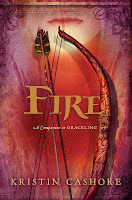 Hi guys. Sorry for the recent radio silence on the blog; I'm traveling. But I wanted to pop in about something that might intrigue those of you with an interest in indie music and how it's made.
Hi guys. Sorry for the recent radio silence on the blog; I'm traveling. But I wanted to pop in about something that might intrigue those of you with an interest in indie music and how it's made.Sometime ago, I blogged about a stupendous cover of "Norwegian Wood" and "Kashmir" performed by the Aaron English Band. I've kept track of Aaron English's musical doings since then, and now he and the talented, ukulele-playing, singing, songwriting Victoria Vox have a new side collaboration called Boombox Séance. It's "uketronica": indie-folk and dance-floor electronica. From their own site: "Their sound features a baritone ukulele played through a loop pedal, driving kick drum, keyboards and the acrobatic vocal harmonies" of Victoria and Aaron. AND, they're recording their debut album -- with your participation, if you're interested -- check out their pledge drive at Pledge Music. They're offering some pretty fun stuff to pledgers (a cover song of your choice, an original song, a signed CD plus zucchini bread!, workshopping one of your songs, visiting the Baltimore Museum of Art with Victoria or an afternoon in Seattle with Aaron, a mystery box!, etc. (who doesn't want a mystery box?!)). And updates from the studio -- photos, videos, songs -- for those of us who love to see the birth of music. Check it out, guys.
I'll be home soon, I'll screw my head on straight, and hopefully I'll get back to more regular blogging. Happy almost-December, everyone!
Published on November 27, 2012 11:55
November 20, 2012
Spotted on the Fridge of Codenames: TLR and Perfect Gentleman
Published on November 20, 2012 10:44
November 17, 2012
Flight from New York to Las Vegas, noon, left side of the plane.
At 32,000 feet, there are ice crystals on my window and we're flying above snow-covered peaks. Yet the sun through my window is so relentlessly hot and strong that I have to keep the shade down, and when I touch it, it burns me.
I usually take the position of the sun into consideration when choosing my plane seat, but this time, common sense eluded me! I feel like a rotisserie chicken.


I usually take the position of the sun into consideration when choosing my plane seat, but this time, common sense eluded me! I feel like a rotisserie chicken.

Published on November 17, 2012 12:52
November 16, 2012
Click to Enbiggen
Published on November 16, 2012 14:09
November 12, 2012
NCTE-ALAN. Also, fun things.
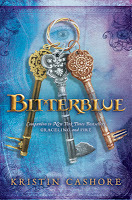 I would like a poster of today's xkcd to hang on my wall: Diagram of the Up Goer Five.
I would like a poster of today's xkcd to hang on my wall: Diagram of the Up Goer Five.Also, I like this (surreal!) video about Finnish ice fisherpeople.
******
Okay. Here's my public events schedule for NCTE-ALAN in Vegas next weekend. Location of all events: The MGM Grand Hotel & Casino | 3799 Las Vegas Boulevard South | Las Vegas, NV 89109. Which is just WEIRD.
Sunday, November 18th
11:00 AM – 12:00 PM: Signing in the Penguin Booth, #101-105.
12:00 PM – 12:30 PM: Signing at Anderson’s Bookshop, Booth #147.
Monday, November 19th
8:40 AM – 9:15 AM: ALAN Workshop -- Fantasy Panel. With Rae Carson, Shannon Hale, and Maggie Stiefvater. MGM Grand | Level Three | Premier Ballroom | Rooms 309-311.
9:15 AM – 10:15 AM: (silent) ALAN Book Signing.
I... cannot explain why that last book signing is silent. But I will try to find out.
ETA: Ha! Okay, regarding the silent signing: ALAN takes place in one big ballroom, and the next panel will be going on during the signing. So we will have to whisper. Thanks for explaining, Laura!
Published on November 12, 2012 13:09
November 8, 2012
Les Miserables, the (New) (Live Sung) Movie
The new movie of the musical Les Miserables, coming out this winter, is live sung -- the actors are singing each take live, instead of miming to a recording. This video explains how and why, and I think it's pretty interesting. (H/t, B!)

Published on November 08, 2012 16:25
November 4, 2012
And While I've Got Bumper Stickers on the Brain
Here are a few spotted in Jamaica Plain...
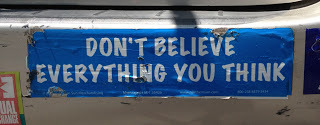
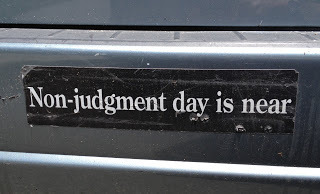
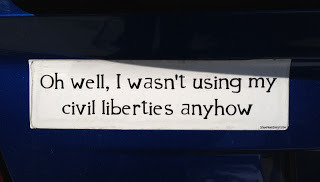

Gloucester...
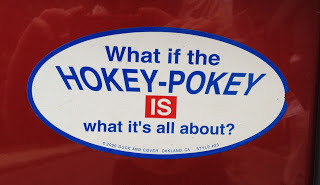
Cambridge...
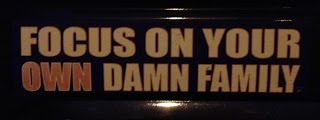
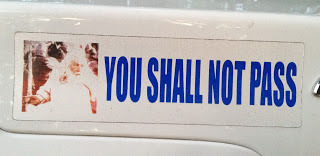 Thanks, Erik :)
Thanks, Erik :)
 For this one, too.
For this one, too.
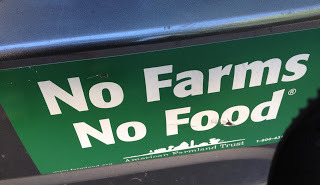

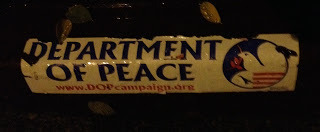
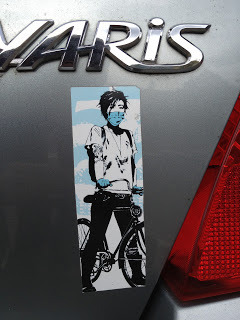


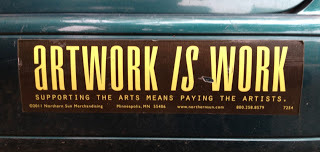
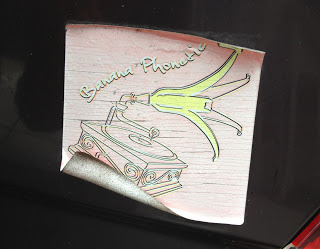
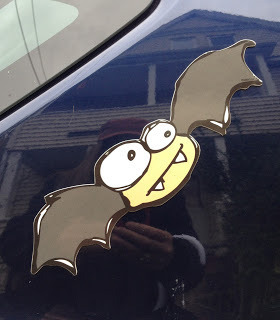
Swampscott...
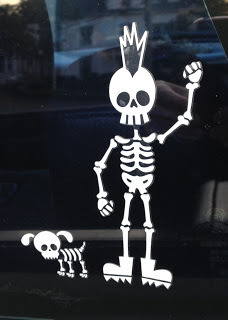

and Austin.
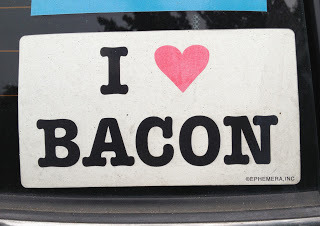

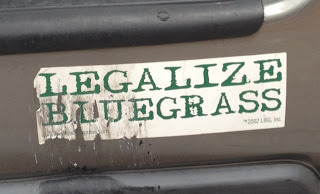
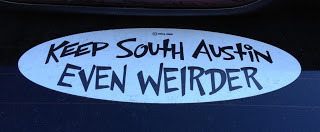






Gloucester...

Cambridge...

 Thanks, Erik :)
Thanks, Erik :)
 For this one, too.
For this one, too.









Swampscott...


and Austin.





Published on November 04, 2012 21:00
Kristin Cashore's Blog
- Kristin Cashore's profile
- 16946 followers
Kristin Cashore isn't a Goodreads Author
(yet),
but they
do have a blog,
so here are some recent posts imported from
their feed.


